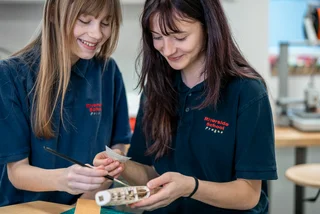Those of you who read the first article in this series will know that every fortnight we will attempt to explain one Czech idiom; that is, one phrase which expresses a thought that could not be arrived at by an understanding of the individual words it is comprised of. You should also now be able to understand and even to use one such phrase, “dělat z komára velblouda.”
The idiom we will focus on today is ‘zlom vaz,’ which translates, rather unpleasantly, as ‘break your neck.’ Still more unpleasant is the inextricable added sense of fatality. This particular idiom is, you see, something of a curve ball in the sense that ‘vaz,’ which you will most likely find translated as ‘nape,’ ‘back of the neck,’ or, ‘ligament,’ takes on the added literal or figurative sense of death or downfall when used with ‘zlomit,’ that is, ‘break.’
PARTNER ARTICLE
We are throwing you in the deep end today, to employ the English idiom, not only because we trust in your native intelligence and powers of language acquisition, but also because this is the perfect place from which to ask the question of exactly how sadistic are the people of the nation you have chosen to call home, that they should desire of friends and colleagues such a violent end? This is a theme we will pursue for the next few of articles of the series.
“Zlom vaz,” you see, is the Czech equivalent of the English phrase “break a leg,” which is used most commonly by people in ‘The Business,’ that is, show business, to wish good luck.
There are, as is ever the case with popular phrases, a myriad of wildly differing explanations for why this has come to be. As far as the English idiom goes, the phrase may indeed suggest violence, with actors being encouraged to perform with such brio that the audience would stamp their approval, as audiences in Greek plays were wont to do, with such vehemence that they would literally break their leg.
More genteel is the alternative explanation that the ‘break’ concerned is merely aesthetic, the break of the line of their leg during a bow, when one leg was placed behind the other, or indeed, a break in the line of the leg to kneel to collect the money Elizabethan audiences would throw onto the stage. This explanation is very much in the minority since in all variants upon this phrase, one common thread is the wishing of bad luck to evade a taboo on too directly wishing good luck. There is, it seems, a powerful superstition ubiquitous in Theatrical circles, that to wish good luck is actually bad luck.
There seems, for this reason, to be a variation upon the tradition of not wishing good luck in every culture, and thus every language. Each seems to express something of the national culture. The Russians wish good luck by saying “neither down nor feathers,” something which derives from an old hunters’ phrase for coming back empty handed. The pat reply is “to the devil.” In Turkey it is common to say “break the devil’s leg.” The French, most characteristically, perhaps, merely utter the single word “merde,” which needs no translation, and to which the conventional response is a growl.
The Czechs then, are not alone in willing your misfortune, they are merely, as is often the case, rather more fervent than other nations in the way they go about it. As to whether this is an expression of something buried deep within their natural character, we wish you the best of luck in finding out!
Examples: (with literal English translation)
A: Jsem moc nervózní, protože mám večer představení.
B: Neboj se, dobře to dopadne. Zlom vaz.
A: I am very nervous because I have a show (performance) tonight.
B: Don’t worry, it will end up all right. Break your neck.
A: Kam jdeš?
B: Na zkoušku z ekonomie.
A: Tak zlom vaz.
A: Where are you going?
B: To the economy exam.
A: So, break your neck.
GRAMMAR NOTE: ZLOM is the familiar form of the imperative of the verb ZLOMIT which takes the accusative. VAZ is unchanged in the accusative.
Provided by MAVO Jazyková škola
***
Other Czech idioms:
Part 1. – Dělat z komára velblouda (making a camel out of a mosquito)
Part 2. – Zlom vaz (break your neck)
Part 3. – Zabít dvě mouchy jednou ranou (kill two flies with one hit)












 Reading time: 3 minutes
Reading time: 3 minutes 


















